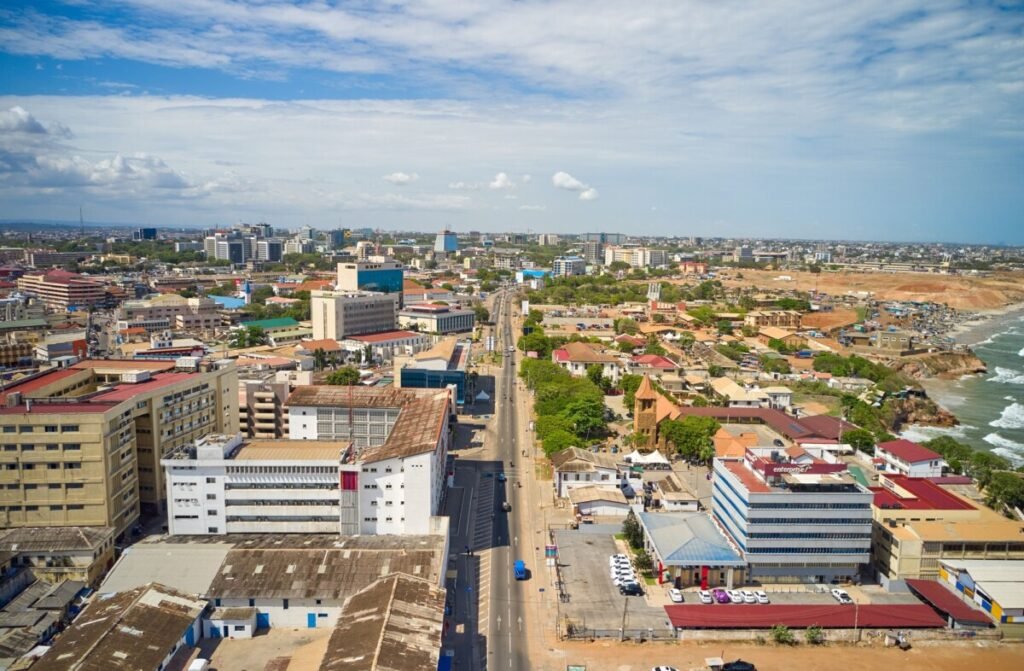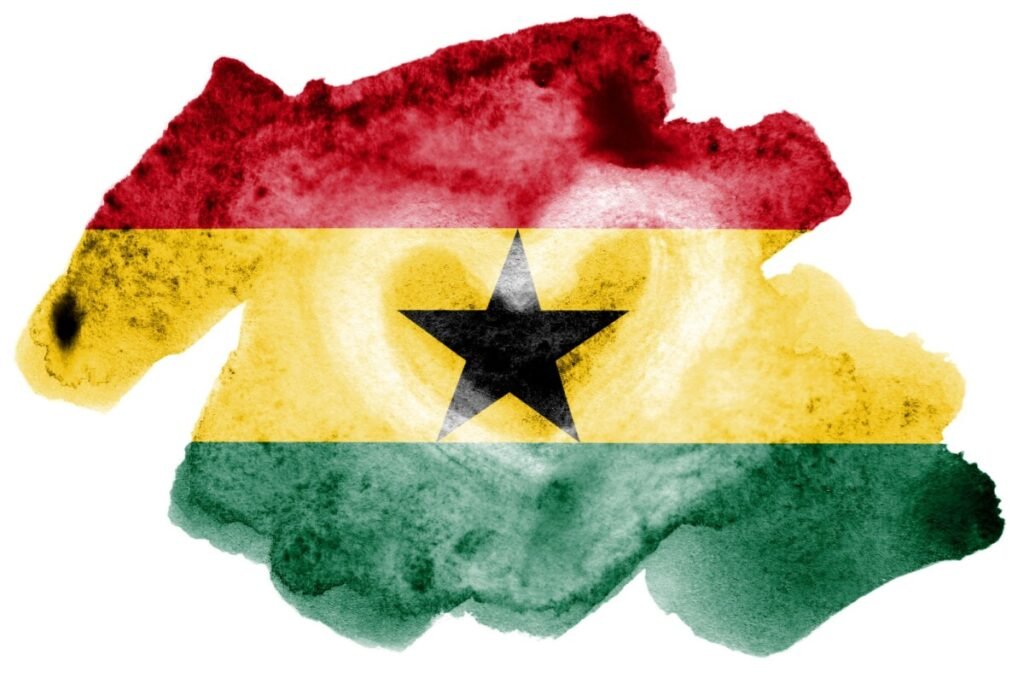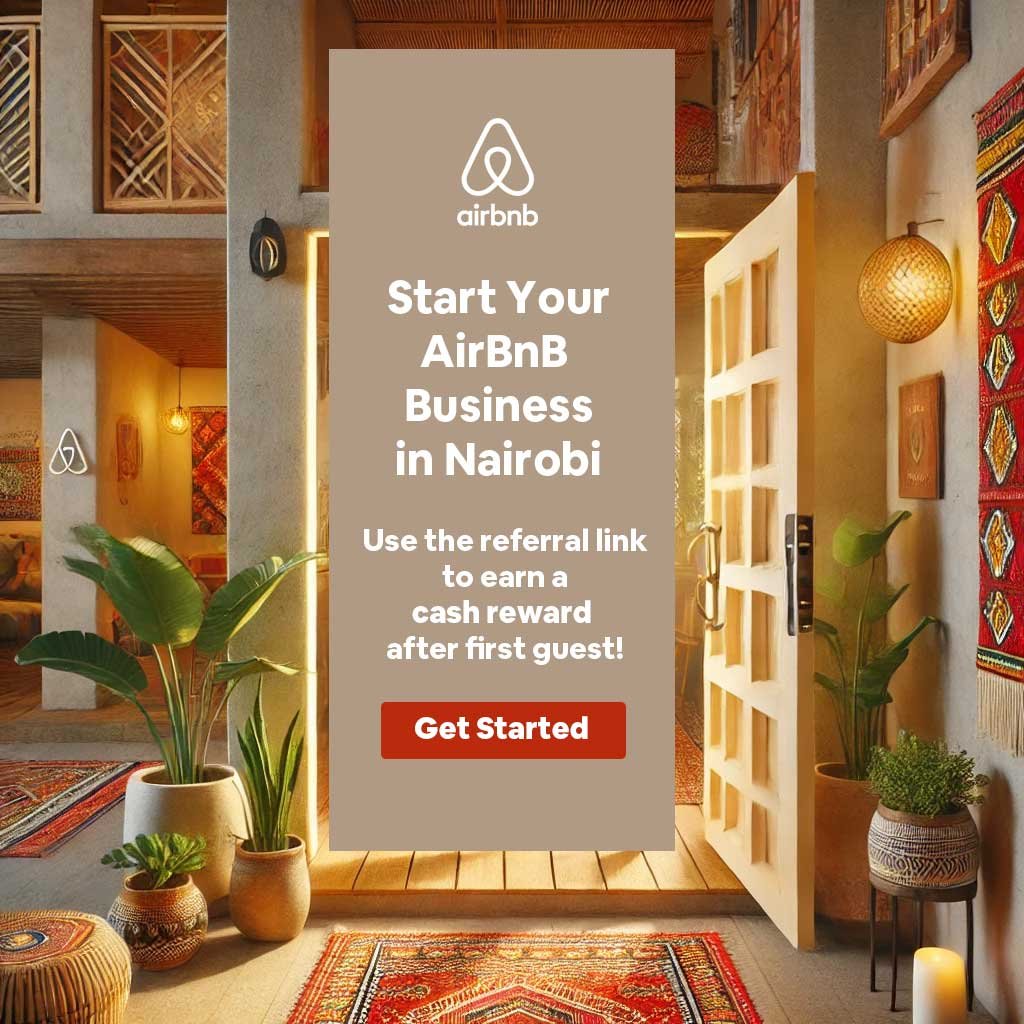Market Highlight
Formally known as the Gold Coast, Ghana is the second most populous country in West Africa. The country covers an area of 238,533 km². In 2020, Ghana exported products worth $13.1 billion and services worth $9.38 billion. Top exports include gold ($6 billion), crude petroleum ($2.71 billion), cocoa beans ($1.28 billion), cocoa paste, coconuts, cashews and Brazil nuts (the $775 million). Switzerland, the United Arab Emirates, China, India and the Netherlands are the top export destinations of Ghana. COVID-19 halted Ghana’s growth of 7% annually over 2017–2019. Commodity exports declined sharply, slowing to 0.5% in 2020. However, growth recovered to 5.4% in 2021, driven by the agriculture and services sectors. Inflation increased from 12.6% in 2021 to 31.7% YoY (an 18-year high) in July 2022.

Key Facts
- Currency: Ghanaian Cedi (GHS)
- Exchange rate (per $): GHS 14.80 (January 2025). Up from GHS 12.00 in January 2024.
- Foreign direct investment inflow: $2.61 billion
- Official language: English
- Major religions: Islam, Christianity
- Major exports: Gold, crude petroleum, cocoa
What are government incentives and policies for ICT sector in Ghana?
The Government aims to establish Ghana as a regional digital services hub. More than 22 government programmes were launched in 1985–2020 supporting digital entrepreneurship. Ghana has a good infrastructure with abundant energy, a road network, good internet and a stable political environment. The Government also supports start-ups by providing training and other support services.
In the Accra region, there are some 200 budding start-ups. Nine different areas and cities have more than 30 support organizations. The Government’s aim in driving ICT development in the country is to create an inclusive digital economy accessible to all the citizens and benefits sectors such as education, health, agriculture, retail and commerce.
The key objectives include:
- Develop local ICT industry to match international standards and deliver services to all of Africa
- Make ICT services accessible in rural areas of the country
- Enhance efficiency, improve public engagement with the Government, foster better transparency of government services and improve revenue from government services using digital means.
In its attempt to achieve a digital address system, Ghana developed e-procurement, e-parliament, e-immigration and e-judiciary platforms.
The National ICT policy, launched in 2003, was reviewed in 2011 to include cybersecurity and broadband. The strategies and measures as outlined include development areas such as quality of service, mobile number portability, broadband availability, national digital broadcasting migration, subscriber identity module (SIM) card registration, provision of teleconferencing equipment, construction of the national data centre and regional innovation centres, provision of modern ICT infrastructure, e-services, e-immigration, e-justice, e-parliament, e-government procurement and business process outsourcing.
Business development incentives
The income tax rate for all sectors except petroleum, mining and the hotel industry is 25%. The income tax levied on petroleum and mining is 35%, while the hotel industry’s income tax liability is 22%.
Young ICT entrepreneurs have five years of tax holidays.
- After five years, a 15% tax rate is applied to ICT companies in Accra
- 12.5% rate for companies in other regional capitals outside of Tema and Accra
- 10% in regions outside Accra, Tema and other provincial capitals
What is the Information and communications technology landscape like in Ghana?
Key driver for economic growth
Data from the Ghana Statistical Service show that the ICT sector contributed 6.4% of the total services GDP in 2017–2021. The contribution to overall GDP stood at 4% in 2020. The industry’s contribution to total services GDP has been growing since 2017, reaching 9% in 2021 (YoY).
According to the OEC, Ghana exported $123 million in ICT services in 2020, accounting for 1.6% of total service exports.
ICT service exports grew 19% over 2019–2020.
Accra is the technology hub in Ghana
Two Ghanaian cities have a population of at least 1 million people, while nine have a population between 100,000 and 1 million.242 The national capital, Accra, is Ghana’s most populous city and the epicentre of technology innovation.
A 20-hectare ICT park is under construction in Accra. In its first phase, the ICT park will provide modern offices tailored for tech and business services companies in its 7,300 m2 space.
What are the ICT hubs/tech parks/start-up hubs in Ghana?
ICT hubs/tech parks/start-up hubs in Ghana include:
- Meltwater Entrepreneurial School of Technology
- Impact Hub
- iSpace Foundation
- Developers in Vogue
- CodeTrain
- Ghana Tech Lab
The ICT sector was valued at $1 billion in 2022 and is expected to grow by 500% to reach $5 billion by 2030
Several software, technology equipment and IT service companies are present in Ghana, serving neighbouring markets.
Some highlights of the service provider landscape are described below:
Key locations: Providers mainly operate out of Accra.
Government prioritized the sector. During the pandemic, Ghana announced the Ghana COVID-19 Alleviation and Revitalization of Enterprises Support programme (Ghana CARES) or Obaatan Pa. It was a two-phase, 3 1/2-year programme that cost the Government $9.5 billion.245 The programme focused on emergency COVID-19 relief measures in its first phase. Phase two (in progress and termed revitalize and transform the economy) focuses on technology and strengthening digital-related policies and technologies. The programme outlines the Government’s approach to develop the ICT/digital economy in 2022 and 2023.
Technology giants are opening IT innovation centres in Ghana. In 2019, Google opened its first African artificial intelligence laboratory in Ghana. In 2022, Google opened an additional office to drive artificial intelligence research in Accra. TechGulf, a San Francisco based technology company, is developing data centres in Ghana. The company is also creating a tech start-up hub. It aims to improve Ghana’s digital maturity, aligning itself with the country’s digitization agenda. Service providers are also investing in Ghana’s telecom infrastructure. For instance, American Tower Corporation is a major investor in Ghana’s telecom infrastructure. Africa Data Centres, a member of the Cassava Technologies group and a communications solutions provider operating in 13 countries in eastern, southern and South Africa, planned to build a 30 MW data centre in Accra in 2022. The firm is also building data centres in Kenya, Nigeria, Togo and South Africa. The business announced a $500 million commitment in 2021 to build 10 data centres across 10 African nations by 2024.
Investing in human capital to fuel sector growth
Ghana has improved its score on the World Bank HCI from 0.4 in 2018 to 0.5 in 2020. The index calculates the capital lost by nations due to poor health and education. The HCI scales from 0 to 1, with 1 being the achievement of maximal potential.
In 2019, there were 19 public institutions and 73 private universities. About 20% of students were enrolled in 73 private universities and 80% in state universities.
With roughly 450,000 graduates entering the job market annually, the ICT industry has a large pool of eligible graduates who can be trained and transformed to become ICT professionals. Ghana has a potentially scalable workforce for business process outsourcing operations. Ghana lags behind other offshoring destinations in tertiary education enrolment. This trend could hamper its ability to expand its offshoring sector.
According to Ghana Statistical Service, 13.4% (1.74 million people) of the total working population (13 million) aged 15 years and above were unemployed in the first quarter of 2022. Adequate training can provide for better employment prospects in IT/BPM operations.
Efforts have been made to strengthen the ICT talent pool in Ghana. These include:
- Huawei’s ICT talent ecosystem programme – Huawei is an essential training partner for Ghana. The company has rolled out several ICT certifications. One such programme was rolled out in 2018, when Huawei began its first class with 21 trainees from MTN, Vodafone, IPMC, AirtelTigo and National Identification Authority. Huawei carried out ICT certification programmes providing industry-recognized certification Huawei Certified Network Professional, Huawei Certified Network Associate and Huawei Certified Internetwork Expert across ICT technologies, such as switching, routing, storage, security and cloud computing.
- Huawei LEAP programme – Huawei’s Leadership, Employability, Advancement and Possibilities (LEAP) programme, launched in 2022, aims to train 100,000 people in ICT technologies by 2025. The programme includes digital capacity building, ICT training and certification courses, ICT skill competitions and initiatives such as the women in tech digital literacy drive.
- Hacklab Foundation – The Hacklab Foundation is a global NGO with its main office in Ghana that focuses on educating young people about technology and fostering their technological aptitude. The foundation provides hackathons, boot camps, mentorship and coaching, digital skills training, internships and job placements.
- Hacklab, in collaboration with major international companies such as IBM, Kwame Nkrumah University of Science and Technology, Standard Bank, Twitter, University of Johannesburg and Vodafone, hosts Hackathon Africa, the largest annual African hackathon, which brings together more than 1,000 tech professionals.
Government targets infrastructure improvements
The private sector in Ghana has worked steadily to improve the ICT infrastructure. In March 2022, MTN announced an investment commitment of $217 million to improve infrastructure and network systems by 2025. The initiative will help Ghana adopt new-age technology in its network infrastructure. In 2021, MTN implemented a total capital expenditure of $214,875, supporting infrastructure expansion and modernization of 4G coverage. The company installed 131, 120 and 1,446, 2G, 3G and 4G sites, respectively. Further, it upgraded 2,121 operational 4G sites. In September 2022, MTN committed an additional $1 billion to improve digital infrastructure in Ghana.
The Ministry of Communications and Digitalisation, which is responsible for licensing and regulating all telecom businesses, regulates ICT sector. Ghana has several opportunities for potential investors. Commercial opportunities as include:
- 400 mUSD opportunity in digital infrastructure (data centres, fibre-optic cables)
- 200 mUSD opportunity in software (sales of software by companies such as IBM, Oracle and SAP)
- 150 mUSD opportunity in training and services
- 115 mUSD opportunity in fintech, health tech and ed tech
- 30 mUSD opportunity in cybersecurity
- 15 mUSD opportunity in cloud infrastructure
Who sets the tech policy priorities in Ghana?
Three primary public agencies administer the Ghana ICT sector. These are:
- Institute of ICT Professionals, Ghana – A not-for-profit agency that comprises members from various ICT domains. The institute acts as a bridge between professionals from government departments and agencies, corporate organizations, educational institutions, investors, start-ups and civil society organizations.
- National Information Technology Agency – This public service institution aims to develop an enterprise-level IT management system at the government level.
- Information Technology Association of Ghana – The association aims to be a forum for IT professionals in Ghana, voicing opinions on various subjects.
What are the growing ICT market segments in Ghana?
Ghana’s key economic sectors that have maximum business potential for ICT include:
- Healthcare
- Financial services
How to register a business in Ghana?
These are the main steps to register a business in Ghana:
- Submit the proposed name of the company to the Registrar General’s Department
- Obtain tax identification numbers for each director and shareholder of the company
- Complete the registration form and submit it to the following: a. Registrar General’s Department b. Domestic Tax Revenue (Income Tax & VAT) Office c. Custom Division Office
- Registration of the company with the Registrar General’s Department
- Complete and submit the registration forms (regulations, Forms 3 and 4, tax registration form)
- Payment of the registration fee and 0.5% of the stated capital of the company
- Receive Certificate to Commence Business, Certificate of Incorporation and certified copies of Form 3, Form 4 and the regulations
- Registration with Ghana Revenue Authority. Requirements include:
- Certificate of Incorporation
- Certificate to Commence Business
- Regulations of the company
- Detailed curricula vitae of the company directors
- Registration with Social Security & National Insurance Trust
- Filling registration form
- Obtaining the certification of registration
- Registration with Ghana Investment Promotion Centre
- Open an account with a bank in Ghana
- Transfer the foreign shareholder’s equity into the bank account
- Submit the completed registration form
- Receive GIPC certificate
Why choose Revise
3 Reasons That Makes Revise Different.
Discover What Sets Us Apart for Seamless Market Entry Success
-
Tailored Local Expertise
Our deep knowledge of East Africa regulatory landscape, business networks, and cultural nuances ensures a smooth and compliant market entry. We help you navigate tax policies, incentives, and partnerships to position your business for success
-
End-to-End Market Entry Solutions
From company incorporation and legal compliance to recruitment, co-working spaces, and business development, we provide comprehensive services to get you up and running quickly and cost-effectively.
-
Access to Strategic Partnerships
Revise offers exclusive connections to local stakeholders, from industry leaders to innovation hubs, enabling you to tap into high-value ecosystems in sectors like renewable energy, agribusiness, and ICT for rapid market growth.



